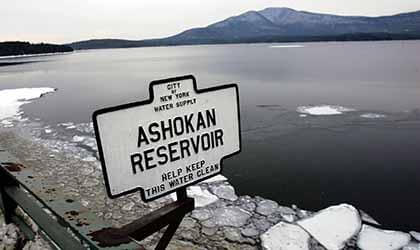By Anna Gustafson
Queens legislators cheered the state Senate’s passage of a bill that would place a moratorium on drilling for natural gas in the upstate watershed, which provides drinking water for 9 million city and Westchester County residents.
Elected officials passed the legislation sponsored by Sen. Joseph Addabbo (D-Howard Beach) Aug. 4 that would temporarily stop all gas drilling in the watershed until the U.S. Environmental Protection Agency completes its study of the effects of natural gas drilling on water and public health. The study began in March and is expected to end within two years.
The Assembly is expected to vote on the measure in September.
The legislation would rule out the possibility that companies could use hydraulic fracturing, a process of extracting natural gas that entails injecting up to 5 million gallons of water laced with chemicals into the ground at high pressure to break the rock. Officials have long criticized the process, saying it poses health risks to the water supply and residents.
“I believe this bill provides a rational, prudent approach to the practice of hydrofracking,” Addabbo said. “This drilling process has possible short- and long-term health and safety implications and is the subject of a pending report, which needs to be reviewed and evaluated.”
Assemblyman Steven Englebright (D-East Setauket) is sponsoring the Assembly’s version of the bill.
“The passage of the hydraulic fracturing moratorium bill by the New York State Senate is an historic victory for all New Yorkers,” said City Councilman James Gennaro (D-Fresh Meadows), chairman of the Council Environmental Protection Committee. “For two years, [Council] Speaker Christine Quinn and I have advocated relentlessly against the environmental perils of hydraulic fracturing and demanded that the state take strong measures to protect New York City’s drinking water supply watershed.”
According to a report prepared by Manhattan Borough President Scott Stringer, seven states in the country have experienced serious incidents of water contamination and explosions near hydraulic fracturing sites.
The method has been criticized by city government officials and environmentalists, who often cite a 2008 report from the U.S. Land Management Bureau that said groundwater in Sublette County, Wyo., which has one of the country’s largest natural gas fields and where hydraulic fracturing was commonly employed, was contaminated with benzene, a substance that has been linked to cancer and nervous system disorders.
“Hydraulic fracturing is an extremely haphazard practice that stands to put the city’s drinking water supply and, in turn, the lives and welfare of New York City residents at great risk,” Quinn (D-Manhattan) said. “It is critical that we put an end to this practice immediately, and at least until the practice has been studied in far greater detail and the questions concerning its potential threats have been answered.”
Reach reporter Anna Gustafson by e-mail at agustafson@cnglocal.com or by phone at 718-260-4574.



































